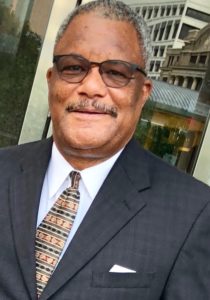Connection with George Floyd, Sobriety, and Passion for the Mission
We are happy to introduce one of our three new board members.
 For a kid raised by a single mom with five children in a New Orleans housing project, Burnell Jones, JD, has come a long way. Add in his drive to overcome chemical dependency and remain 22 years sober, it’s a great example of the power of recovery.
For a kid raised by a single mom with five children in a New Orleans housing project, Burnell Jones, JD, has come a long way. Add in his drive to overcome chemical dependency and remain 22 years sober, it’s a great example of the power of recovery.
“Many people don’t get a great start coming from vulnerable urban communities,” Jones states. “The prevalence of drugs, gangs, and crime are formidable obstacles that are difficult to face, let alone survive.”
Jones’ ticket out was earning a four-year scholarship and degree at Boston College. He moved to Houston to continue his education at Texas Southern University Thurgood Marshall School of Law, graduating with honors. Jones began his private legal practice in 1983 and is still practicing today.
Recovery Journey Impacts his Practice
Jones became sober at age 40. For the last 20 years, he has made it his avocation to work with people with substance use issues similar to his past experiences and approaches his law practice a little differently today. When appropriate, he shares his experience, strength, and hope, in an attempt to relate to his client’s present circumstances. He offers other alternatives, that may include treatment options with hope of recovery instead of continuing the cycle of pain and incarceration.
“I became more of a counselor than an attorney,” Jones states. “An attorney protects their client’s rights while a counselor seeks to offer preventative resolutions that may help to restore lives.”
Jones has also worked with drug courts along the way while focusing on the criminal side of the justice system. Those who suffer from addiction and are facing criminal charges, he explains, are driven by a dependency and have lost the power of choice once the substance enters their body. They are driven and take actions they wouldn’t necessarily take in a sober state of mind.
“I like that fight, because it’s a winnable one,” Jones shares. “There are a lot of people who don’t know another way to live – they are lost. They have an illness and need to get treated. Treatment and continuing on in their recovery gives people a chance for a different life.”
Jones says that’s why places like Houston Recovery Center are so necessary. “We want to clean them up, turn them around, and send them on their way with the additional support that increases the likelihood for success,” he relates. “The rest is up to them.”
Contribution to HRC Board
As an attorney, Jones hopes his experience in the criminal justice system, representing people with a similar background that the HRC is trying to help, will be his largest contribution to the board.
“I’ve been on both sides of it,” he shares. “I know what it’s like to lose your way. Alcohol allowed me to escape life for the moment, but it’s a vicious cycle. Now through recovery and my work I have an opportunity to help people on that same journey.”
What makes him most passionate about serving on the board? “The opportunity to give back. Sobriety is a gift, he says. “You can’t keep it unless you give it away.” Jones feels like he’s been getting prepared for this opportunity all along.
“At this point in my life, I don’t think there is a better place for me to be,” Jones relates. “Now the opportunity presents itself through the board, and I couldn’t do it in a bigger arena. It doesn’t get any better than this.”
Jones also serves as director and legal counsel for The Anonymous Alliance of Charitable Organizations, Inc. and The Power House Recovery Center.
Burnell Jones represented George Floyd as his defense attorney back in the late 1990s. He didn’t remember until a Wall Street Journal reporter contacted him recently for an article about Floyd’s past.
“To be honest, I was a little fearful when she told me thinking “What did I do wrong?”,” he laughs. “I’ve been looking at his name and face and couldn’t place him. When I saw the document with my signature, that settled me.”